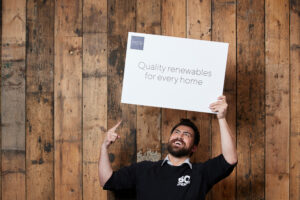Battle of the Nations: Renewable uptake across the UK in 2023
1 February 2024
2023 has been a record-breaking year for renewable uptake across the UK. The four home nations have shown fantastic progress in transitioning from fossil fuels to renewable energy to heat and power their nations’ homes. Let’s take a closer look at their performance in 2023.

Let’s start with England
In 2023 alone, nearly 175,000 small-scale renewables were installed across England, marking a 32% increase on 2022. This brings England’s all-time installation count to 1,378,870, which accounts for over 5.7% of households with a certified renewable installation.
It’s no surprise that solar PV is once again England’s leading small-scale renewable technology. In 2023, we saw just short of 150,000 solar PV installations across England, with a staggering 2,829 of our contractors in England now certified for the technology.
Heat pumps also turned up the heat in 2023. We saw that nearly 25,000 certified air source heat pumps were installed across England last year, making 2023 the best performing year on record for this technology! This marks an 11% increase on 2022.
2023 also saw a continual rise in battery storage installations. Battery storage was in fact the third most popular technology type to be installed amongst our contractor base in 2023, with approximately 87% of battery installations in 2023 being installed in England.
England had some big policy wins in 2023, particularly towards the end of the year.
Last October, we saw the grant value for heat pumps increase from £5,000 to £7,500 under the Boiler Upgrade Scheme (BUS). This opened the possibility of owning a heat pump to thousands of homeowners across England and Wales. Since the grant increase, we have seen average weekly applications for BUS vouchers soar from 331 to 1,172! In December, the government then announced the allocation of an additional £1.5 billion in funding to the Boiler Upgrade Scheme (BUS) until 2028, which will allow for an additional 200,000 vouchers for homeowners across England and Wales.
Wales is winning with its renewable workforce
Wales ended the year on top for small-scale renewable installation uptake, surpassing the rest of the UK nations! At the end of 2023, we saw Wales reach 112,627 certified installations since records began in 2008. This accounts for nearly 8.4% of Welsh households having some form of certified renewable technology installed – which is fantastic! Wales ended the year with six areas in the UK’s top 10 for renewable uptake being the Isle of Anglesey, Ceredigion, Powys, Gwynedd, Pembrokeshire and Denbighshire. Anglesey was a clear winner for Wales, with a staggering 5.6% of households in Anglesey with a renewable installation.
Wales also led the way in terms of solar PV uptake, again surpassing the rest of the home nations. Over 6.7% of households in Wales now have solar PV installed. This reflects the growing demand amongst Welsh homeowners to generate their own home-grown electricity, reduce their energy bills, and decrease their carbon footprint.
In 2023, Wales also made significant progress in terms of heat pump uptake, with 5,853 heat pumps installed across the year. This is more than double the amount of heat pumps that were installed in Wales in 2022.
 This was no longer after the grant value for heat pumps was increased from £5,000 to £7,500 under the Boiler Upgrade Scheme (BUS), showing the positive impact of the BUS on heat pump uptake.
This was no longer after the grant value for heat pumps was increased from £5,000 to £7,500 under the Boiler Upgrade Scheme (BUS), showing the positive impact of the BUS on heat pump uptake.
With the recent roll out of their Net Zero skills consultation, the Welsh Government are committed to developing their Net Zero workforce. MCS look forward to working closely with the Welsh Government to build a robust, renewable workforce that is ready to meet the current demand for renewable energy across Wales.
Scotland is steering towards sustainable energy
Scotland, which had the highest renewable uptake in 2022, fell just short of Wales with over 8.2% of households having a renewable installation by the end of 2023. It was great to see that Scotland ended the year with four areas in the UK’s top 10 for renewable uptake. These areas were Dumfries and Galloway, Moray, Perth & Kinross and Na h-Eileanan Siar.
However, Scotland ended the year with the highest heat pump uptake in the UK! Our data shows that over 35,000 heat pump installations are now installed across Scottish homes and businesses.
Since its launch in 2015, the Home Energy Scotland Grant (HES) and Loan has played a big part in Scotland’s transition away from fossil fuel boilers to heat pumps. The HES grant provides Scottish consumers with £7,500 towards the cost of a heat pump, with some Scottish households able to claim up to £9,000 with a rural uplift. Heat pumps are one of the most efficient and sustainable heating solutions for homes and are a vital part of Scotland’s plans to reach Net Zero by 2045.
Northern Ireland is navigating Net Zero
Northern Ireland is making progress in terms of transitioning to renewable energy. Our latest data shows that there are 32,755 small-scale renewable installations in Northern Ireland, which accounts for just under 4.4% of households having a renewable installation.

In 2023, solar PV made up nearly 100% of certified installations in Northern Ireland, with the top local authority for uptake being Newry, Mourne and Down. This growth reflects the impact of supportive Government policy on solar PV uptake, as in May last year a zero rate of VAT for the supply and installation of solar PV was implemented.
Last year, Northern Ireland set a target for 80% of its electricity consumption to come from renewable sources by 2030.We are excited to see small-scale renewables play a vital part in Northern Ireland reaching its Net Zero targets and will continue to monitor the nation’s progress in 2024.
Moving into 2024
In 2024, we expect to see more and more small-scale renewable technologies being installed across the UK, as more homeowners turn to renewable energy to heat and power their homes.
Last year we learned that VAT will be removed from battery storage installations from 1 February 2024. We are excited to see batteries storage systems become more accessible and affordable for homeowners across the UK. MCS has already seen a remarkable growth in the number of heat pump and battery installations across 2023, and we look forward to reaching new milestones in 2024.
We are also excited to see the new MCS Scheme come into effect in summer 2024. We are eager to reset the Scheme’s consumer protections to give people the confidence that they need to engage with small-scale renewables.
We also look forward to enrolling the first intake of students onto the Low Carbon Heating Technician apprenticeship in September 2024. The apprenticeship is a UK first and we already have several colleges and training providers signed up to deliver it to students. We look forward to seeing this dedicated training pathway develop an army of competent renewable heating installers with the skills, knowledge and expertise to install low-carbon heating technologies to the highest standard.
MCS is proud to be giving people confidence in home-grown energy and is excited to continue our crucial role in the decarbonisation of the UK’s homes.
For near-real-time updates on installations, register for free now to use the MCS Data Dashboard and track trends and opportunities in the uptake of small-scale renewables across the UK.
